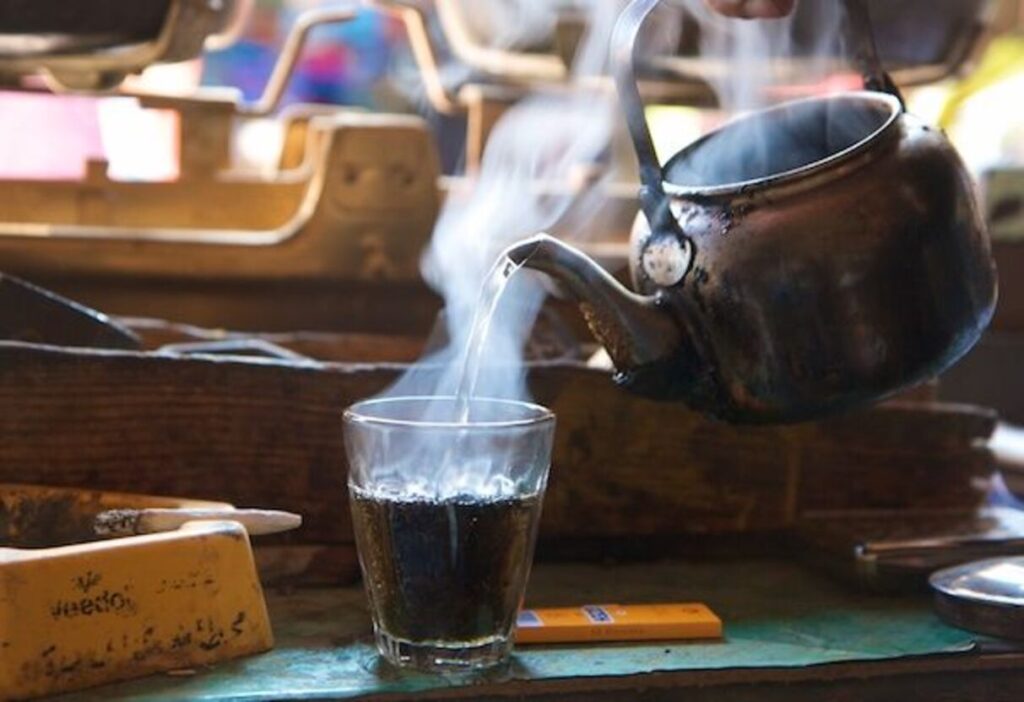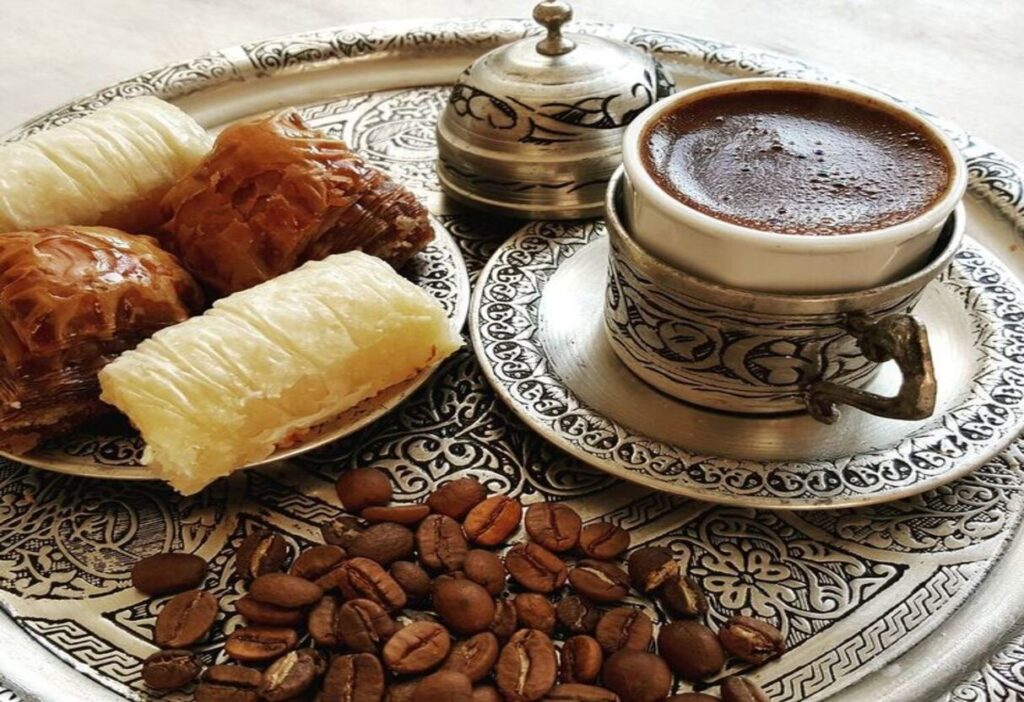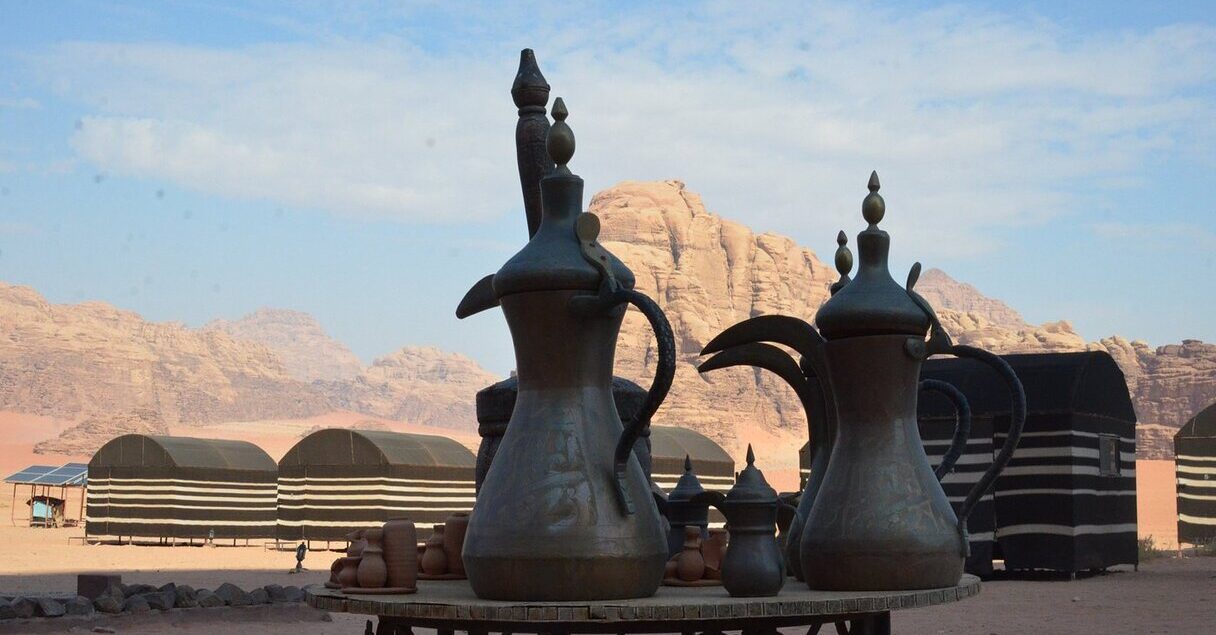Beans and Beyond: Jordan’s Rich Coffee Culture
If you’re a coffee lover, you might want to consider exploring Jordan’s rich coffee culture. Jordan is a country steeped in tradition and hospitality, and coffee is an essential part of daily life. From the bustling streets of Amman to the serene countryside, coffee is the perfect way to connect with the locals and experience the country’s unique culture.

Image via Ottsworld Travel on Pinterest
Jordan’s coffee culture is deeply rooted in tradition, and the preparation and serving of coffee is considered an art form. Coffee has been an essential part of Jordanian culture for centuries, and it is often served to guests as a sign of hospitality and respect. The preparation of coffee in Jordan is steeped in tradition, and it is often served with dates, a traditional symbol of hospitality.
If you’re a coffee lover, you’ll find that Jordan’s coffee culture is diverse and dynamic. From the ancient traditions of Bedouin coffee to the contemporary trends of specialty coffee shops, Jordan has something for everyone. Whether you prefer your coffee strong and black or sweet and creamy, you’ll find that Jordan’s coffee culture is rich and varied. So why not explore Jordan’s coffee culture and experience the country’s warm hospitality and rich traditions?
History and Significance of Coffee in Jordan
Jordan has a rich coffee culture that is steeped in history and tradition. The Middle East has been the birthplace of coffee, and Jordan is no exception. Coffee has been an integral part of Jordanian culture for centuries, and it is deeply ingrained in the social customs and traditions of the country.
The history of coffee in Jordan dates back to the Ottoman Empire, when coffee was first introduced to the region. Bedouin culture played a significant role in the spread of coffee, as Bedouins were the first to cultivate and roast coffee beans. Over time, coffee became a symbol of hospitality and generosity, and it was served to guests as a sign of respect and friendship.
The significance of coffee in Jordanian culture is reflected in the way it is served and consumed. Coffee is typically served in small cups called finjan, which are only filled halfway to allow the drinker to enjoy the aroma and flavor. The coffee is usually served without sugar, but with dates or candied fruits on the side to sweeten the taste. There is a whole etiquette and protocol associated with serving and drinking Arabic coffee in Jordan. For example, when serving coffee, you should hold the dallah (coffee pot) in your left hand, cups in the right, and pour a small amount, just a few centilitres no more than a tablespoon. Knock the tip of the dallah at the edge of the cup to prevent leaking or flowing, and to alert the guest that the cup of coffee is ready.
Amman, the capital city of Jordan, is a hub of coffee culture, with a wide range of coffee shops and cafes that serve traditional Arabic coffee as well as modern coffee drinks. Whether you are a coffee lover or not, exploring the rich coffee culture of Jordan is a fascinating experience that offers a glimpse into the country’s history, traditions, and social customs.
Traditional Coffee Ceremony
Jordan’s coffee culture is steeped in tradition. One of the most important traditions is the coffee ceremony, which is a symbol of hospitality and respect. The ceremony is a way to welcome guests and show them that they are valued.
Preparation and Brewing
The coffee used in the ceremony is typically Arabic coffee, which is made from roasted and ground coffee beans. To prepare the coffee, it is first ground and then mixed with water and cardamom. The mixture is then boiled in a dallah, a traditional Arabic coffee pot.
The brewing process is an important part of the ceremony. The coffee is brewed three times, with each cup becoming progressively weaker. The first cup is strong and bitter, the second cup is milder, and the third cup is the weakest. The brewing process can take up to an hour, and the coffee is typically served in small cups.
Etiquette and Symbolism
The coffee ceremony is steeped in symbolism and etiquette. The coffee is always served with the right hand, as the left hand is considered unclean. The host pours the coffee into the cups, starting with the guest of honor and then moving clockwise around the room.
Sugar and dates are typically served with the coffee, and guests are expected to eat at least one date. The amber color of the coffee is said to represent life, and the shaking of the dallah before pouring is said to represent the Bedouin tribes’ survival in the harsh desert environment.
Respect is an essential part of the ceremony, and guests are expected to show respect to the host and to each other. The Bedouin tribes, who are known for their nomadic way of life, developed the coffee ceremony as a way to show respect and build relationships with other tribes.
In conclusion, the traditional coffee ceremony is an essential part of Jordan’s rich coffee culture. It is a way to welcome guests, show respect, and build relationships. The ceremony’s etiquette and symbolism are steeped in tradition, and the brewing process is an art form in itself.
Modern Coffee Culture in Jordan
Jordan’s coffee culture has evolved over the years, with the influence of Western-style espresso and the rise of specialty coffee shops. In this section, we’ll explore these trends and their impact on the country’s coffee scene.
Influence of Western-Style Espresso
The introduction of Western-style espresso has had a significant impact on Jordan’s coffee culture. Cafés like Starbucks have become popular among Jordanians, especially the younger generation. They offer a range of espresso-based drinks, such as lattes and cappuccinos, which have become increasingly popular in recent years.
However, traditional coffee culture is still an integral part of Jordanian culture. Dimitri’s Coffee, for example, is a popular café chain that serves traditional Arabic coffee. This type of coffee is brewed in a finjan, a small pot, and is often served with dates or candied fruits.
Rise of Specialty Coffee Shops
Specialty coffee shops have also emerged in Jordan in recent years, catering to the growing demand for high-quality coffee. These shops offer a range of specialty coffee drinks, such as pour-overs and cold brews, and often roast their own beans in-house.
This trend has been driven by a growing interest in specialty coffee among Jordanians and travelers alike. Specialty coffee shops have become a popular destination for those looking to experience the country’s coffee culture in a new and unique way.
Overall, Jordan’s coffee culture is a blend of traditional and modern influences. While Western-style espresso and specialty coffee shops have become increasingly popular, traditional Arabic coffee culture remains an integral part of Jordanian culture, particularly at weddings and other social gatherings. Whether you prefer traditional or specialty coffee, Jordan has something to offer for every coffee lover.
Coffee in Social Contexts
In Jordan, coffee is not just a beverage; it is a symbol of hospitality and social connection. As a guest in a Jordanian home, you will be welcomed with a cup of coffee, often referred to as “qahwa sada,” which means “light coffee.” The coffee is usually served with dates or other small sweets as a sign of hospitality.
The preparation of coffee in Jordan is a ritualistic process that involves brewing the coffee on a stove and adding cardamom seeds for flavor. The coffee is then poured into a silver holder and served in small cups. The foam on top of the coffee is an important part of the presentation, and it is considered a sign of quality.
In addition to coffee, Jordanians also enjoy smoking shisha, which is a water pipe that is filled with flavored tobacco. Shisha is often enjoyed in coffee houses, which are popular social gathering places. The Jungle Fever Coffee and Tea House is a popular coffee house in Amman that offers a relaxing atmosphere, live music, and a variety of coffee and tea options.
When you are a guest in a Jordanian home, it is important to follow certain customs and etiquette. For example, it is customary to remove your shoes before entering the home and to dress modestly. You should also be prepared to engage in conversation and communicate with your hosts, as communication is an important part of Jordanian culture.
Overall, coffee plays an important role in Jordanian social contexts, and it is a symbol of hospitality and connection. Whether you are enjoying a cup of coffee in a Bedouin tent or a coffee house in Amman, you can expect to be welcomed with open arms and a warm cup of coffee.
Exploring Coffee Destinations in Jordan
Jordan is a country with a rich coffee culture, and there are plenty of destinations to explore if you’re a coffee lover. Whether you’re in Amman, the capital, or out in the desert with the Bedouin, there are plenty of options to choose from.
If you’re in Amman, there are plenty of cafés to visit. Dimitri’s Coffee is a popular spot with locals and tourists alike. They serve a variety of coffee drinks, as well as pastries and sandwiches. Jungle Fever Coffee and Tea House is another great option. They have a cozy atmosphere and serve a variety of coffee and tea drinks. Seven Pennies Coffee is a newer café that has quickly gained popularity. They serve specialty coffee drinks and have a great selection of pastries.
If you’re interested in art, the National Gallery of Fine Arts is a great place to visit. They have a café on-site that serves coffee and light snacks. It’s a great spot to relax and take in some culture.
If you’re out in the desert with the Bedouin, you’ll likely be offered coffee as a sign of hospitality. Bedouin coffee is traditionally made with cardamom and is served in small cups. It’s a delicious way to experience the local culture.
Finally, if you’re looking for a unique coffee experience, consider visiting Desert Land. They serve coffee made with beans that have been roasted in the desert sun. It’s a one-of-a-kind experience that you won’t find anywhere else.
No matter where you are in Jordan, there’s sure to be a coffee destination that suits your tastes.
Frequently Asked Questions

Image via Bunaa on Pinterest
What is the history of coffee in Jordan?
Coffee has a long and storied history in the Middle East, and Jordan is no exception. The arrival of coffee in Jordan is said to date back to the 15th century, when it was brought to the region by traders from Ethiopia. Over the centuries, coffee became an important part of Jordanian culture, with coffeehouses serving as social gathering places for people from all walks of life.
How is coffee traditionally prepared in Jordan?
In Jordan, coffee is traditionally prepared using Arabic coffee beans, which are finely ground and often mixed with ground cardamom seeds. The coffee and water are boiled over a stove in a special pot until foam rises to the surface. The brew is then poured into tiny cups, often presented in beautiful silver holders.
What are some popular coffee shops in Jordan?
Jordan has a thriving coffee culture, with many popular coffee shops located throughout the country. Some of the most well-known coffee shops in Jordan include Dimitri’s Coffee, which is credited with helping to establish Jordan’s specialty coffee culture, and Al Quds Coffee, which is known for its traditional Arabic coffee and warm hospitality.
How does Jordanian coffee differ from other types of coffee?
Jordanian coffee is distinct from other types of coffee in several ways. For one, it is typically prepared using Arabic coffee beans, which have a unique flavor profile. Additionally, Jordanian coffee is often mixed with ground cardamom seeds, which gives it a slightly spicy taste. Finally, the way that Jordanian coffee is served – in tiny cups presented in silver holders – is also unique.
What is the significance of coffee in Jordanian culture?
Coffee is an important part of Jordanian culture, serving as a symbol of hospitality and respect. In Jordan, it is customary to offer guests a cup of coffee as a sign of welcome and friendship. Additionally, coffeehouses have long served as gathering places for people from all walks of life, providing a space for conversation, relaxation, and community.
What are some traditional coffee customs in Jordan?
In Jordan, there are several traditional customs associated with coffee. For example, it is customary to serve coffee in tiny cups, with the host pouring the coffee for their guests. Additionally, it is considered polite to drink at least one cup of coffee when it is offered to you, as a sign of respect for your host. Finally, it is traditional to serve dates or other sweets alongside coffee, as a way of balancing out the bitterness of the coffee with something sweet.
Jordan latest travel updates: US, AU , CA , UK
